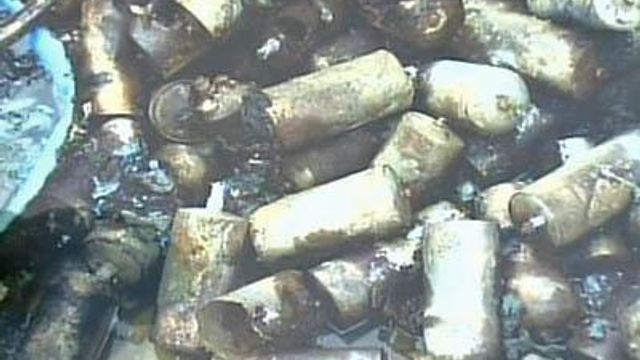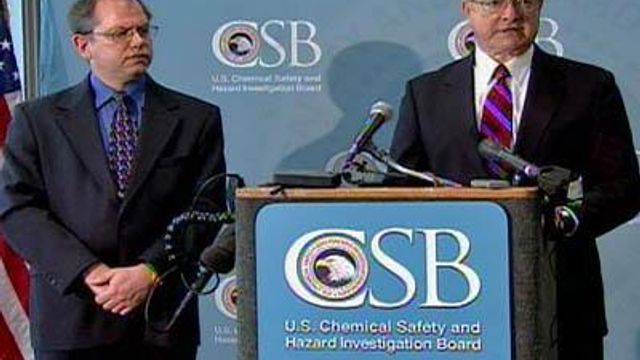Inspectors: Oxygen Canisters Fanned EQ Fire
Federal safety experts announced Wednesday that unspent oxygen canisters used on aircraft contributed to the rapid spread of a major chemical fire in Apex last fall.
Posted — UpdatedThe U.S. Chemical Safety and Hazard Investigation Board issued an "urgent recommendation" to warn other hazardous waste facilities of the potential danger posed by the canisters, also known as oxygen generators because they create and release oxygen in a chemical reaction. The move marks only the third time in the agency's history that such a recommendation has been issued.
The Environmental Quality Industrial Services plant in Apex exploded in flames on Oct. 5, and the fire raged for more than a day before burning itself out. Fearing a toxic cloud had been released by the chemical fire, town officials ordered about 17,000 residents to leave their homes.
A preliminary investigation by the CSB determined the fire might have started in an area of the plant containing oxidizers, which are highly combustible. But investigators said the cause of the fire might never be known.
Further investigation found that the unspent oxygen generators, which are used to supply oxygen to drop-down masks on commercial aircraft that have depressurized, were stored nearby and played a role in fanning what had been a small fire.
"Whatever started the fire, the intensity with which these (generators) burn would have resulted in the rapid spread of the fire as fire departments responded that night," said Robert Hall, the CSB's lead investigator in the case.
The oxygen generators were similar to those implicated in the May 1996 crash of ValuJet Flight 592 in the Everglades, killing all 110 passengers and crew.
The generators at the EQ plant were shipped from Mobile Aerospace Engineering Inc., an aircraft maintenance facility in Mobile, Ala., officials said. Although the devices were past their projected service life, they remained charged and hazardous when they were shipped to EQ for disposal, they said.
The generators also weren't labeled properly before shipping, he said, meaning EQ possibly didn't even know a potential hazard existed.
"They really did not not know the danger that these things posed," Hall said.
The CSB issued its urgent recommendation that Mobile Aerospace notify other hazardous waste handlers of the potential danger posed by the generators and that improper shipping codes might have been used in transporting them. The company also was urged to develop procedures to expend all of the oxygen from generators before shipping and to properly describe the devices on transport documents.
The agency did fault EQ for not having an adequate fire suppression system or firewalls in the plant, which officials said would have slowed the fire, and for not quickly informing firefighters what chemicals were stored in the facility.
EQ spokesman Robert Doyle said in a statement that the safety bulletin would improve precautions across the hazardous waste industry.
"This safety advisory alert will allow for safer management, transport and disposal of these oxygen generators at aircraft maintenance facilities and hazardous waste facilities,” Doyle said.
Apex Mayor Keith Weatherly said he never knew EQ had the oxygen generators on site until he was briefed by CSB officials Wednesday morning.
"This is the first we heard of it. After lengthy investigations and supposedly full disclosure by EQ of what their inventory was ... it's troubling," Weatherly said.
Apex officials maintain they will try to block any attempt by EQ to reopen the operation.
"We can but hope that other communities can learn from our local incident and join us in the efforts to ensure the appropriate siting of such facilities away from residential populations," Weatherly said in a statement.
State environmental regulators fined EQ more than $550,000 in March, citing a series of safety violations before the Oct. 5 fire. The company is fighting the fine and a state effort to revoke its operating permit.
A spokesman for the state Department of Envrironment and Natural Resources said the CSB's findings likely won't affect the permit revocation process. A decision on the company's future in North Carolina is expected next month, he said.
The fire prompted state officials to adopt stricter rules for hazardous waste operations, including providing updated lists of chemicals on site to state and local officials and to nearby residents and businesses. Gov. Mike Easley signed the new regulations into law Tuesday.
• Credits
Copyright 2024 by Capitol Broadcasting Company. All rights reserved. This material may not be published, broadcast, rewritten or redistributed.






